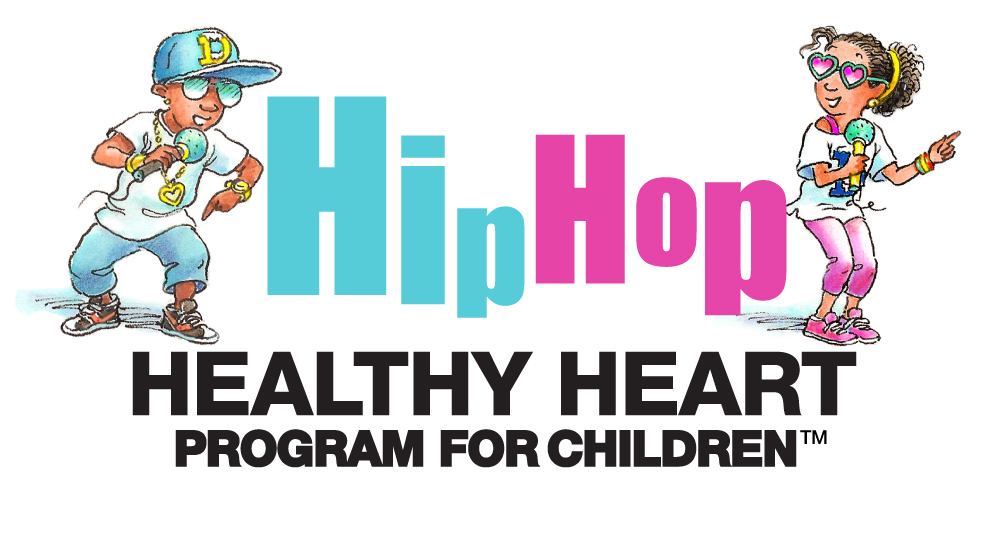
By Jyl Steinback
Healthy students get better grades, miss fewer days of school, and behave better in class. But childhood obesity and correlating health issues are running rampant in America, and niche programs focused only on physical education or nutrition have not worked.
So, how do we turn this around? By building a culture of health with an integrated, whole-child approach that focuses on physical, mental, financial and social well-being.
That’s the mission of the Hip Hop Healthy Heart Program, an integrated, sustainable curriculum that helps create healthier students, as well as healthier families. This holistic curriculum integrates information about exercise, plant-based nutrition and sustainability with techniques like stress reduction, creativity building, positive group dynamics, critical thinking, character development and community involvement.
 Here’s a look at one of the Hip Hop Program modules, illustrating how this approach works:
Here’s a look at one of the Hip Hop Program modules, illustrating how this approach works:
The “PLANT POWER! Plant-Based Nutrition for Healthy Kids” module includes six units and bonus projects collected in a supplementary Plant Power! Workshop.
- Unit 1: Let’s Eat! introduces a whole-food, plant-based approach to nutrition.
- Unit 2: Fruits! focuses on fruits, giving students an easy way to experience one aspect of plant-based nutrition.
- Unit 3: At the Root of It All! introduces complex carbohydrates in starchy vegetables and their role in plant-based nutrition.
- Unit 4: Growlin’ for Grains! expands on the value of complex carbohydrates in a healthy diet and explores the difference between minimally processed and refined grains.
- Unit 5: Make Room for Legumes! focuses on legumes and beans, nuts and seeds and the nutrients they provide.
- Unit 6: Let’s Hear It for Veggies! focuses on the wide variety of vegetables that are found above ground, such as leafy greens, stems and cruciferous plants.
What will each unit include?
- A Plant Power! Workshop is included at the end of the module. The Workshop will feature recipes and project options students can integrate with units or work with after completing the module.
- The Shop Well! Appendix provides information about USDA certification regulations for labeling meat, poultry and eggs.
Why focus on a plant-based diet?
A full-fledged vegan diet provides solid health benefits, and it is sustainable. Study after study shows that plant-based diets can help improve blood pressure, reduce the chance of heart disease, lower cholesterol, and even help prevent Type 2 diabetes. A plant-based diet also can contribute to maintaining a healthy body weight. In fact, a study from Loma Linda University found that, on average, people on a plant-based diet had a lower body mass index than meat eaters.
 Some other benefits of a plant-based diet include:
Some other benefits of a plant-based diet include:
- A decreased risk of cancer, even slowing the progression of certain cancer types.
- The prevention or halted progression of some autoimmune diseases.
- Enhanced longevity.
- Increased energy.
- Improved mood and mental clarity.
Additionally, a United Nations study determined that animal agriculture produces 18 percent of the world’s greenhouse emissions, compared to 13.5 percent for all forms of transportation combined. Never mind the amount of water necessary to raise animals to maturity.
The Hip Hop Healthy Heart curriculum also teaches sustainability through the Healthy Planet module, which includes units Think Green!, Respect and Protect!, Air Aware, Water-Wise, Power Up!, Green Thumb Gardening, and Green Health Care. This module shows students how to respect and protect our natural resources, ranging from air and water to energy-producing resources. For example, in Unit 1 the focus is on ecosystems. Students compare the roles of producers, consumers and decomposers in an ecosystem; they observe an ecosystem and develop and observe a classroom ecosystem. This module also incorporates rhymes and movement into the curriculum, and it promotes team activities to reinforce the message that the elements of the ecosystem work in concert to remain healthy.
There is a clear correlation between physical, social, and financial well-being and academic performance. The Hip Hop Healthy Heart Program’s innovative, multi-pronged approach helps solve many of the greatest problems that face today’s youth, all of which affect academic performance. Education shapes the world, and educators are in the best position to lead this revolution in the necessary lifestyle and behavioral changes of our young people. They just need the right tools.
Jyl Steinbeck is the executive director of Shape Up US, creator of The Hip Hop Healthy Heart Program for Children™ and Clap4HealthSM. She is also the author of over 15 healthy lifestyle cookbooks that have sold over 2 million copies, national spokesperson and 2011 Community Leadership Award winner for the President’s Council on Fitness, Sports & Nutrition.






